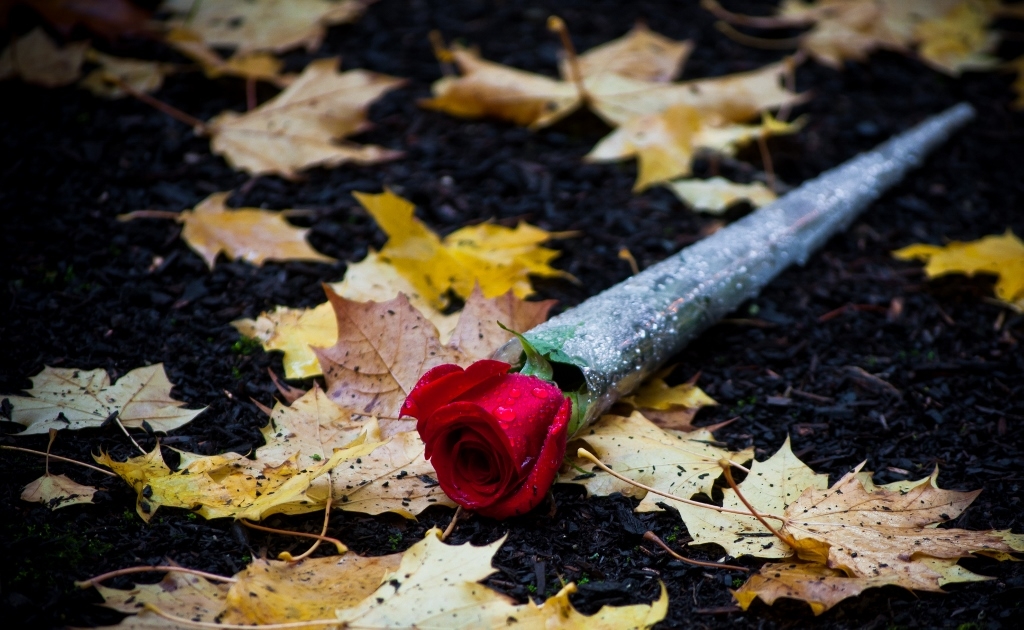Involved in a bus accident that took the lives of six people, David Gibson has been battling through PTSD for over three years. In an effort to better understand himself and to communicate with others, he turned to writing. His first book was The Other Side of Reason: A Journal on PTSD. This column continues that text.
[Where the past meets the present]
Looking down at the ground, my eyes trace the pattern of the fallen leaves that blanket the ground.
The dark earth contrasts their fading fall colours.
Among the leaves rests a red rose. Where it came from, I do not know.
Water droplets caress the rose from the morning’s dew and offer a radiance to the new day’s early light.
Was it put there as a memory to the past, or to a start of a new day?
Can the red rose embody a new meaning and beginning?
I touch the delicate petals understanding the intricate balance of its beauty and meaning.
A wish for our wellbeing today, and for all of our tomorrows,
And bidding adieu to the fallen leaves of September.
____________________________
“Life can only be understood backwards;
but it must be lived forwards.” (Soren Kierkegaard)
Dr. Leo Buscaglia once said that “the past is a cancelled check, the future a promissory note, and the present is cash in hand.” How true. The present is all we truly have. While there is wisdom in preparing for the future, we can get lost in it and miss what we are truly experiencing. The present is our time to live and coincidentally create our evolving life history. When we hold on to the past (going beyond honoring to “stuck in the past”) it robs us of our present. When we live in the future, we vacate the present. We cannot get the present back.
As the anniversary of the 2013 bus/train crash approaches, I would say that I feel a return of the restlessness, anxiety, anger and fear that I experienced after the crash. Psychological literature calls it the anniversary reaction and describes it as an individual's response to unresolved trauma resulting from significant losses. The anniversary reaction can involve several days or even weeks of anxiety, anger, nightmares, flashbacks, depression, or fear. All of which I am still dealing with four years later.
On a more positive note, the anniversary of a traumatic event can also provide an opportunity for emotional healing. From my perspective you can also make significant progress in working through the natural healing process by recognizing, acknowledging, and paying attention to the feelings and issues that surface during your anniversary reaction. These feelings and issues can help you develop perspective on the event and figure out where it fits in your heart, mind and life.
It is important to note that not all survivors of a traumatic event experience an anniversary reaction. Those who do, however, may be troubled because they did not expect and do not understand their reactions.
Memories start out as fragments — sound bite fragments, visual fragments, smell and touch fragments — and so anniversaries of a traumatic event, give people a chance to experience these things individually before they have to make meaning out of it and create a larger representation that could include what they learned from their memorial experience, too.
I do believe the experience imprinted from the accident has in a very fundamental way also changed me. I have also found when an emotion is uncovered and experienced, you can find words for it and put it back into the narrative of your life.
This is why writing has been so important to me.
Writing and finding your voice to describe your feelings has the possibility of creating lots of emotional exits so you don't feel claustrophobic and instead feel "safely held," similar to the idea that psychoanalyst Donald Winnicott talks about in which there is a certain amount of containment within which people can re-experience very troubling emotions but still feel safe.
The process of healing can also be part of memorializing a tragic event in your life. In many ways an anniversary date of a traumatic experience is an opportunity in getting past the shock to developing the ability to think and process what you have been through.
It was more than just the image of the sheared off front of the double-decker bus — this in many ways became the iconic symbol of that tragic distortion. There was a distortion in a lot of our reasoned dialogue in this city, our ability to talk about things. There was a distortion in time where people are still stuck in the past and haven't been able to come back into the present if they were traumatized. And there was a distortion of the meaning — listening to other and different points of view, other people's beliefs. The mourning in many ways has only been in fits and starts and hopefully that mourning conversation will continue but in ways that prevent tragedies like this to ever happen again.
Of course, the real goal of any memorial is to make the experience bearable for people so that they can remember, which the essence of mourning is, and then move on. If we accomplish anything beyond that, then so much the better for this city, the survivors and the families who lost loved ones.
Until next time.

